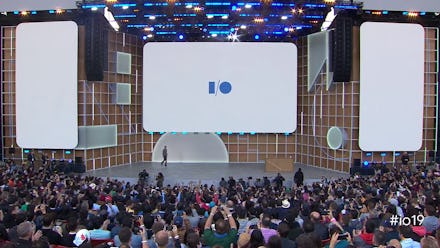Every year, Google hosts the developer conference Google I/O to announce new hardware or software to their Android-loving audience. These speeches often include updates to existing features or new products such as phone models. The two-hour keynote speech set off the first conference day with a bang with numerous announcements and plans for the future. Here's a pick of the most noteworthy highlights from Google I/O 2019.
GOOGLE PIXEL 3A AND 3A XL
These new Pixel phones are a mid-priced option for users looking for a phone that costs less than $500 without wanting to downgrade to much older models. The Google Pixel 3A and 3A XL are reasonably priced at $399 and $479 respectively, much lower than the cost of a Google Pixel 3 at $799. The company's newest models keep the high-tech camera from the Pixel 3 while sacrificing features such as water resistance and wireless charging capabilities. The Verge praised the value of the phone, stating "a $400 phone has a camera that’s among the best you can get on any smartphone."
NEST HUB MAX
Google has decided to move all their home applications, such as Google Home, under the "Nest" brand name from now on. The result is the Google Nest Hub Max: a single device that combines the applications, a security camera, a 10-inch smart display, and loudspeakers all into one package. This allows users to watch videos, make video calls, and check security cameras through the Nest Hub Max. Engadget reports the Nest Hub Max will be available in Summer 2019 for $229.
ANDROID Q BETA 3
The Android Q previews are typically reserved for Android developers to test their apps before the final public release. According to VentureBeat, this operating system will support 5G, offer more privacy options, enable Google's Smart Reply to predict actions, and enable updates to the operating system that won't require users to restart their phones. Android Q will also have a "dark theme," improved gestures and swiping commands, and accessibility features.
GOOGLE MAPS INCOGNITO
The growing public concern for privacy has caught up with Google, and the company showed signs of listening during their announcements. One of the security features includes a new update to Google Maps that will lessen location and search tracking. This is called "incognito mode" and it seems to work similarly to the way the browser, Google Chrome, does. This means the new mode for Google Maps should allow browsing locations without any user data or information saved from the search. Google is also closing an incognito mode loophole in Chrome that allowed websites to block users surfing the web on the low.
GOOGLE LENS
A Google Lens update will be adding more to the image recognition technology that launched in 2017. The presentation provided examples of the update, such as a moment when someone used their smartphone camera on a restaurant menu to pull up information and reviews of the dish online. When partnered with certain magazines, such as Bon Appétit, setting the camera in front of a page can pull the recipe right onto your phone. The camera can also become an on-the-spot translator for over 100 languages by hovering over signs and translating them into your primary language with an overlay.
PROJECT MAINLINE
Google also stated they will be using the Google Play store to release software updates from now on. This comes as good news to some Android users since it relieves the burden of providing updates from phone companies and manufacturers. Under the current system of updates, each phone carrier and manufacturer releases updates at their own pace for every device they provide. Project Mainline will not only allow for regular security updates, but also allow users to update their phones at their convenience.
Google's focus on improvements to existing features, accessibility, and privacy have developers and tech gurus looking forward to future updates.
